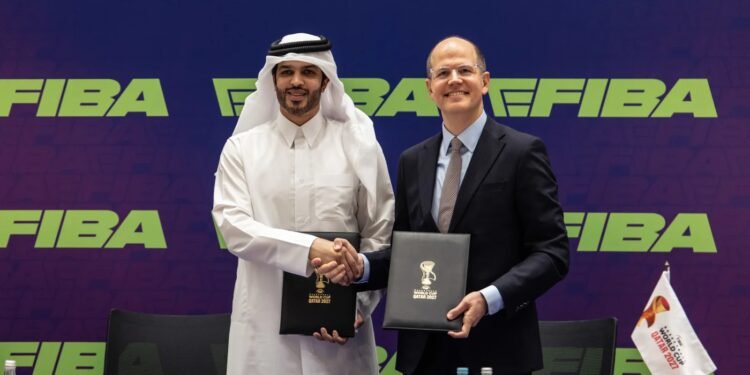Qatar to Host Two eFIBA World Finals Ahead of 2027 Basketball World Cup
Qatar, the upcoming host of the FIBA Basketball World Cup 2027, is set to organise two editions of the tournament’s esports counterpart, the eFIBA World Finals, in the years preceding the main event.
The Gulf nation will stage the fourth and fifth editions of the flagship esports basketball championship in 2026 and 2027, respectively. On Monday, Qatar Basketball Federation President Mohammed Al-Meghaiseeb and FIBA Secretary General Andreas Zagklis signed an agreement confirming Qatar as the host nation for the tournament.
“This represents a significant milestone for us not only as we prepare to host the first FIBA World Cup in the Middle East, but also as we continue pursuing our mission to blend education with sporting excellence,” Al-Meghaiseeb stated during the press conference.
The global tournament, originally launched during the COVID-19 pandemic as the FIBA Esports Open, entered a new format in 2023. The third edition was recently held in the Philippines, where Team USA captured the title after six weeks of competition.
According to Zagklis, the eFIBA tournament has experienced rapid growth in participation and audience engagement, evolving into a major standalone event. “This is not just a stepping stone to the 2027 FIBA World Cup,” he said. “It is a proven concept with a passionate fanbase, talented players, and a dynamic energy that appeals to a younger generation. We’re excited to bring this event to Doha.”
eFIBA, Esports, and Innovation
The eFIBA World Finals play a central role in the wider movement of traditional sports embracing the flourishing esports industry. Similar to football and popular first-person shooter titles, basketball is tapping into a growing worldwide fan base of virtual sports.
Even the International Olympic Committee (IOC) has embraced virtual competitions, aligning with the surge in global esports interest. The sector is predicted to reach $1.86 billion in revenue by 2025 (QAR 6.77 billion), nearly double its 2020 figures, according to PWC. This boom is attributed to rising numbers of content creators and attractive sponsorship deals.
FIBA sees the eFIBA World Finals as a vital avenue to drive long-term innovation and youth engagement, which Zagklis notes will be a critical agenda point in the upcoming FIBA Congress. “Innovation is a core pillar of FIBA’s strategy for this term and beyond. The eFIBA World Finals is a key project within that vision,” he said.
Zagklis highlighted that the format’s similarity to traditional basketball—from 5-on-5 team setups and national representation to tactical gameplay—adds credibility and appeal to both basketball enthusiasts and video game audiences. He believes the tournament is poised to reach the “next level” with Qatar’s involvement.
From Qatar’s perspective, hosting two consecutive editions offers a strategic chance to engage local communities and appeal to younger demographics. “The role of esports is significantly expanding,” Al-Meghaiseeb added. “Its economic impact is substantial. This event marks another important step in our mission to raise awareness and promote both basketball and its digital format.”
— V.2 Editorial Team
































